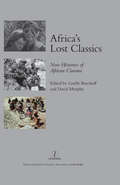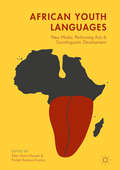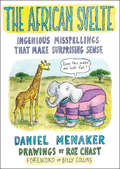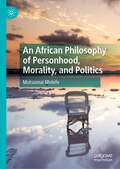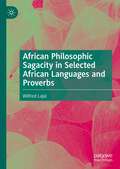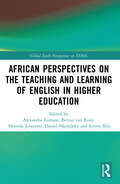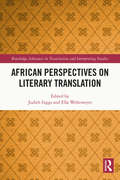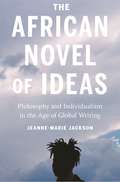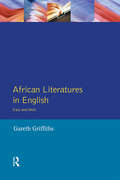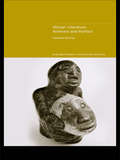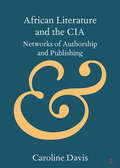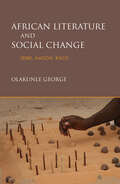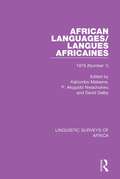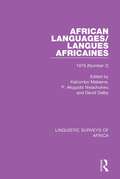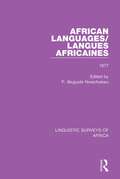- Table View
- List View
Africa's Lost Classics: New Histories of African Cinema
by Lizelle BisschoffUntil recently, the story of African film was marked by a series of truncated histories: many outstanding films from earlier decades were virtually inaccessible and thus often excluded from critical accounts. However, various conservation projects since the turn of the century have now begun to make many of these films available to critics and audiences in a way that was unimaginable just a decade ago. In this accessible and lively collection of essays, Lizelle Bisschoff and David Murphy draw together the best scholarship on the diverse and fragmented strands of African film history. Their volume recovers over 30 'lost' African classic films from 1920-2010 in order to provide a more complex genealogy and begin to trace new histories of African filmmaking: from 1920s Egyptian melodramas through lost gems from apartheid South Africa to neglected works by great Francophone directors, the full diversity of African cinema will be revealed.
African Youth Languages: New Media, Performing Arts And Sociolinguistic Development
by Ellen Hurst-Harosh Fridah Kanana ErastusThis book showcases current research on language in new media, the performing arts and music in Africa, emphasising the role that youth play in language change and development. The authors demonstrate how the efforts of young people to throw off old colonial languages and create new local ones has become a site of language creativity. <P><P>Analysing the language of ‘new media’, including social media, print media and new media technologies, and of creative arts such as performance poetry, hip-hop and rap, they use empirical research from such diverse countries as Cameroon, Nigeria, Kenya, the Ivory Coast and South Africa. <P>This original edited collection will appeal to students and scholars of African sociolinguistics, particularly in the light of the rapidly changing globalized context in which we live.
African Voices on Slavery and the Slave Trade
by Alice Bellagamba Sandra E. Greene Martin A. Klein Alice Bellagamba Sandra E. GreeneThough the history of slavery is a central topic for African, Atlantic world and world history, most of the sources presenting research in this area are European in origin. To cast light on African perspectives, and on the point of view of enslaved men and women, this group of top Africanist scholars has examined both conventional historical sources (such as European travel accounts, colonial documents, court cases, and missionary records) and less-explored sources of information (such as folklore, oral traditions, songs and proverbs, life histories collected by missionaries and colonial officials, correspondence in Arabic, and consular and admiralty interviews with runaway slaves). Each source has a short introduction highlighting its significance and orienting the reader. This first of two volumes provides students and scholars with a trove of African sources for studying African slavery and slave trade.
African Voices on Slavery and the Slave Trade
by Bellagamba, Alice and Greene, Sandra E. and Klein, Martin A. Alice Bellagamba Sandra E. Greene Martin A. KleinThough the history of slavery is a central topic for African, Atlantic world and world history, most of the sources presenting research in this area are European in origin. To cast light on African perspectives, and on the point of view of enslaved men and women, this group of top Africanist scholars has examined both conventional historical sources (such as European travel accounts, colonial documents, court cases, and missionary records) and less-explored sources of information (such as folklore, oral traditions, songs and proverbs, life histories collected by missionaries and colonial officials, correspondence in Arabic, and consular and admiralty interviews with runaway slaves). Each source has a short introduction highlighting its significance and orienting the reader. This first of two volumes provides students and scholars with a trove of African sources for studying African slavery and slave trade.
The African Svelte: Ingenious Misspellings That Make Surprising Sense
by Billy Collins Daniel Menaker Roz ChastInspired by his tenure at The New Yorker, this collection of comical, revelatory errors foraged from the wilds of everyday English comes with commentary by the author, illustrations by Roz Chast, and a foreword from Billy Collins. During his time at The New Yorker, Daniel Menaker happened across a superb spelling mistake: "The zebras were grazing on the African svelte." Fascinated by the idea of unintentionally meaningful spelling errors, he began to see that these gaffes--neither typos nor auto-corrects--are sometimes more interesting than their straight-laced counterparts. Through examples he has collected over the course of his decades-long career as an editor and writer, he brings us to a new understanding of language--how it's used, what it means, and what fun it can be. Illustrated by the inimitable Roz Chast, with a foreword from former poet laureate Billy Collins, The African Svelte offers thoughtful and intelligent exit Jesus. Menaker glances at familiar fumbles like "for all intensive purposes" and "doggy-dog world," but readers delighted by language will find themselves turning the pages with baited breath to discover fresh howlers that have them laughing off their dairy airs.
An African Philosophy of Personhood, Morality, and Politics
by Motsamai MolefeThis book explores the salient ethical idea of personhood in African philosophy. It is a philosophical exposition that pursues the ethical and political consequences of the normative idea of personhood as a robust or even foundational ethical category. Personhood refers to the moral achievements of the moral agent usually captured in terms of a virtuous character, which have consequences for both morality and politics. The aim is not to argue for the plausibility of the ethical and political consequences of the idea of personhood. Rather, the book showcases some of the moral-political content and consequences of the account it presents.
African Philosophic Sagacity in Selected African Languages and Proverbs
by Wilfred LajulThis book explores African philosophic sagacity, or wisdom philosophy, as proposed by Odera Oruka in his “Four Trends in Current African Philosophy” (1981), which he later expanded to six trends (1998). Oruka defines philosophic sagacity as wisdom philosophy, or philosophy of the wise men of Africa who are independent, liberal and non-conformist thinkers, and who often deviate from the accepted common norms of their societies. This book takes philosophic sagacity discourse beyond Oruka’s definition by encompassing traditional wise sayings and proverbs. It combines individual liberal thinkers and the communal ideas, and cherishes both rational and emotional engagement, offering a broader understanding of African philosophic sagacity. Wilfred Lajul opens the door for new researchers to venture into the study of African languages, wisdom sayings, and proverbs, and helps to unveil the content of this philosophy from the perspective of different African societies.
African Perspectives on the Teaching and Learning of English in Higher Education (Global South Perspectives on TESOL)
by Alexandra Esimaje Bertus Van Rooy ‘Demola Jolayemi Daniel Nkemleke Ernest KluThis book brings together the work of African scholars and educators directly involved in initiatives to improve the teaching and learning of English in higher education across Africa. Offering alternative perspectives across different African countries with examples of decolonised practice in research, the book provides a critical discussion and examples of successful practice in the teaching of English in Africa. Each chapter of the book reports on a specific context and a specific teaching and/or learning initiative in higher education, with emphasis on comparability of information and on clear evaluation and critical analysis of the intervention. The editors offer a thoughtful comparison of different methods, strategies and results to provide an authoritative reference to effective strategies for English teaching and learning. The book paints a cohesive picture of the field of English language teaching in Africa and will be of great interest to researchers, scholars and postgraduate students in the areas of applied linguistics, English teaching and comparative education.
African Perspectives on Literary Translation (Routledge Advances in Translation and Interpreting Studies)
by Judith Inggs Ella WehrmeyerThis collection serves as a showcase for literary translation research with a focus on African perspectives, highlighting theoretical and methodological developments in the discipline while shedding further light on the literary landscape in Africa. The book offers a framework for understanding key approaches and topics in literary translation situated in the African context, covering foundational concepts as well as new directions within the field. The first half of the volume focuses on the translation product, exploring such topics as translation strategies, literary genres, and self-translation, while the second half examines process and reception, allowing for an in-depth look at agency, habitus, and ethics. Each chapter is structured to allow for the introduction of a given theoretical aspect of literary translation followed by a summary of a completed research project with an African focus showing theory in practice, offering a model for readers to build their own literary translation research projects while also underscoring the range of perspectives and unique challenges to literary translation work in Africa. This unique volume is a key resource for students and scholars in translation studies, giving visibility to African perspectives on literary translation while pointing the way forward for future research directions.
The African Novel of Ideas: Philosophy and Individualism in the Age of Global Writing
by Jeanne-Marie JacksonAn ambitious look at the African novel and its connections to African philosophy in the twentieth and twenty-first centuriesThe African Novel of Ideas focuses on the role of the philosophical novel and the place of philosophy more broadly in the intellectual life of the African continent, from the early twentieth century to today. Examining works from the Gold Coast, South Africa, Uganda, and Zimbabwe, and tracing how such writers as J. E. Casely Hayford, Imraan Coovadia, Tendai Huchu, Jennifer Nansubuga Makumbi, and Stanlake Samkange reconcile deep contemplation with their social situations, Jeanne-Marie Jackson offers a new way of reading and understanding African literature.Jackson begins with Fante anticolonial worldliness in prenationalist Ghana, moves through efforts to systematize Shona philosophy in 1970s Zimbabwe, looks at the Ugandan novel Kintu as a treatise on pluralistic rationality, and arrives at the treatment of “philosophical suicide” by current southern African writers. As Jackson charts philosophy's evolution from a dominant to marginal presence in African literary discourse across the past hundred years, she assesses the push and pull of subjective experience and abstract thought.The first major transnational exploration of African literature in conversation with philosophy, The African Novel of Ideas redefines the place of the African experience within literary history.
African Literatures in English: East and West (Longman Literature In English Series)
by Gareth GriffithsHere is an introduction to the history of English writing from East and West Africa drawing on a range of texts from the slave diaspora to the post-war upsurge in African English language and literature from these regions.
African Literature, Animism and Politics: Animism And Politics (Routledge Research in Postcolonial Literatures #Vol. 4)
by Caroline RooneyThis book marks an important contribution to colonial and postcolonial studies in its clarification of the African discourse of consciousness and its far-reaching analyses of a literature of animism. It will be of great interest to scholars in many fields including literary and critical theory, philosophy, anthropology, politics and psychoanalysis.
African Literature and the CIA: Networks of Authorship and Publishing (Elements in Publishing and Book Culture)
by Caroline DavisDuring the period of decolonisation in Africa, the CIA subsidised a number of African authors, editors and publishers as part of its anti-communist covert propaganda strategy. Managed by two front organisations, the Congress of Cultural Freedom and the Farfield Foundation, its Africa programme stretched across the continent, with hubs in Ibadan, Kampala, Nairobi, Cape Town and Johannesburg. This Element unravels the hidden networks and associations underpinning African literary publishing in the 1960s; it investigates the success of the CIA in disrupting and infiltrating African literary magazines and publishing firms, and determines the extent to which new circuits of cultural and literary power emerged. Based on new archival evidence relating to the Transcription Centre, The Classic and The New African, it includes case studies of Wole Soyinka, Nat Nakasa and Bessie Head, which assess how their literary careers were influenced by these transnational literary institutions, and their response to these interventions.
African Literature and Social Change: Tribe, Nation, Race
by Olakunle GeorgeAlert to the ways in which critical theory and imaginative literature can enrich each other, African Literature and Social Change reframes the ongoing project of African literature. Concentrating on texts that are not usually considered together--writings by little-known black missionaries, so called "black whitemen," and better-known 20th century intellectuals and creative writers--Olakunle George shows the ways in which these writings have addressed notions of ethnicity, nation, and race and how the debates need to be rehistoricized today. George presents Africa as a site of complex desires and contradictions, refashioning the way African literature is positioned within current discussions of globalism, diaspora, and postcolonialism.
African Languages/Langues Africaines: Volume 5 (1) 1979 (Linguistic Surveys of Africa #27)
by Kahombo Mateene P. AkụJụobi Nwachukwu David DalbyVolume 5 (1) of African Languages originally published in 1979, is a special issue focussing on the Bantu languages in Tanzania. The languages are discussed according to 4 regions of Tanzania and although the sub-grouping is lexicostatistical, the classification is borne out by other consdierations, such as phonology and verbal morphology.
African Languages/Langues Africaines: Volume 5 (2) 1979 (Linguistic Surveys of Africa #28)
by Kahombo Mateene P. AkụJụobi Nwachukwu David DalbyVolume 5 (2) of African Languages originally published in 1979, is a special issue focussing on languages and education in Africa. There are chapters on African language education from a socio-linguistic perspective, the problems of bi-lingualism and multi-lingualism in Zaire and small languages in primary education.
African Languages/Langues Africaines: Volume 3 1977 (Linguistic Surveys of Africa #25)
by P. AkỤJỤobi NwachukwuVolume 3 of African Languages includes articles originally published in 1977, written in French and English on educational, literary, cultural, historical and socio-linguistic aspects of language in Africa, as well as descriptive and comparative studies. Among others there are chapters on the national language issue in Africa (Akan in Ghana), a socio-linguistic case study of the Hausa language in Nigeria and assimiliation and lexical coinages in Igbo.

